- Home
- Nicholas Sparks
Three Weeks With My Brother Page 5
Three Weeks With My Brother Read online
Page 5
When I reflected on my childhood, I usually recalled it as light without shadow, as if the dark edges never existed. Or if they did, they were something to be reveled in, like badges of honor. Dangerous events were transformed over the years into humorous anecdotes; painful moments were modified into sweet tales of innocence. In the past, when asked about my parents, I usually responded that my mom and dad were both ordinary and typical, as was my childhood. Lately, however, I’ve come to realize that while my comments were true in some ways, they rang false in others, and it wasn’t until I had children of my own that I finally began to understand the daily pressures that must have plagued both of them. Parenthood is fraught with worry, and my parents—despite the long leash they gave us—no doubt worried about us frequently. But if raising children is difficult, I’ve learned that marriage is sometimes even more challenging, and in this, my parents’ was no exception.
By early 1972, my parents were struggling to keep their household intact. We were children and were unaware of the details; all we knew was that my dad had begun whistling all the time, and by then, it had begun to take on ominous significance. The sound of those nameless melodies, with their pitch rising and falling, was the first of the warning signs of my father’s anger that we children grew to recognize—DEFCON 1, if you will.
In DEFCON 2, mumbling would be added to the whistling and my dad would pace in circles, refusing to talk to anyone. DEFCON 3 was indicated by the actual thinning of his lips, and in DEFCON 4, his face would begin turning red. He was sometimes able to halt the eventual progression toward nuclear launch, but if he ever hit DEFCON 5—where he would curl his tongue against his bottom teeth so that his tongue protruded from his mouth, held in place with his top teeth, we kids knew our best option was one of two things: run or hide. We knew he’d be reaching for his belt, which had replaced the flyswatter as the instrument of punishment.
Those moments, while still rare, were growing more frequent. Looking back, I can’t say that I blame him. In 1963, he was a young, recently married, starving student; nine years later, he was still a starving student, only with the added responsibility of providing for a family of five. Working had slowed his education to a glacial pace, and trying to write a dissertation with the three of us using the apartment as our playground in the evenings was enough to drive anyone nuts.
My mom, on the other hand, continued to adore us unequivocally. When we tagged along with her to the store or she brought us to church, she was quick to display her pride to anyone who happened to be nearby. She had an uncanny ability to forget how rotten we were at times, but her ability to forgive was tempered by the same toughness she’d forever been instilling in us. As wild as we got, as far afield as we roamed, there was never a doubt in either my brother’s mind or mine exactly who was in charge. If mom said to be home by dinner, we were home. If she said to clean up our bedroom, we did so right away. And if we happened to make a mistake, she’d make sure that we corrected it. She also defended us like a mother bear when she felt it was merited. When a teacher slapped Micah at school, my mom stormed in that afternoon, dragging Micah and me behind her.
“If you ever slap my child again, I’ll call the police and have you arrested. You will NOT touch my child.”
On the way out, Micah and I strutted like roosters, thinking, Take that, you old bat. My mom showed you who’s boss . . .
“You’re the best, Mom,” Micah preened. My mom whirled around and brought a finger to his face.
“Don’t think for a second that I don’t know why she slapped you. You probably deserved it, and if you ever talk back to her like that again, I’ll show you what a real slap feels like.”
“Okay, Mom.”
“You know I love you, right?”
“Yes, Mom.”
“You know I’ll always stand up for you, right?”
“Yes, Mom.”
“But I’m still disappointed in you. And you’ll be grounded for this.”
Micah was grounded, but the disappointment hurt worse. We hated to disappoint her.
Despite the pressures my parents were under, my dad gradually became more comfortable with us as we grew older. At times, he would let us crawl up into his lap as he watched old horror movies on television—he absolutely loved horror movies—and we came to treasure these moments, pining for them like the exquisite morsels they were. Naturally, we became extremely knowledgeable in the proper ways to kill vampires and werewolves in the event that our family was ever confronted by such a being. My brother and I had carved a collection of wooden stakes out of Popsicle sticks, which we kept under the bed.
In ever rarer quiet moments, my dad used to play the guitar for us as well. His sound was fluid and assured, and one evening he surprised us by telling us that he’d once been in a band.
The thought of my father in a band was fairly heady stuff. It meant that our dad not only had magic powers, but was cool, and of the two, this was of greater importance to us. We knew after all that we were cool, and we thought our parents were, too. But now we had proof.
We liked to imagine our dad playing before screaming crowds—the kind we saw on television when the Beatles played. We even had long conversations about it, but our dad simply laughed when we asked him how he’d been able to fend all those girls off.
“My band wasn’t quite that popular,” he tried to explain, but we didn’t believe him. Why should we? The facts, after all, were clear. He was in a band. He sang and played like a professional. And he used to live in England. What could be more obvious? After a while, I think we actually convinced ourselves that he not only knew Paul McCartney and John Lennon personally, but had played no small role in their success.
And he was our dad.
Aside from watching spooky movies, listening to him play became our favorite activity with him. Usually, we’d be goofing off in the living room when we’d hear him start tuning his guitar. This was our signal to calm down, and we’d quickly take our places at his feet.
He never rushed. He always made sure the guitar’s pitch was perfect. He seldom sang right away—I think he was shy— but instead, would simply strum through a few songs, tapping his foot in time. His fingers moved amazingly fast, as if guided by unknown forces, and when he looked at us, he’d smile, occcasionally waggling his eyebrows.
Eventually he would sing, and we’d listen raptly for as long as he did. And when he finally got around to playing something by the Beatles, my brother, sister, and I would glance knowingly at one another, sharing the same thought: “See, I told you he knew them.”
Perhaps responding to the rising tension in the house—by that time, my parents had begun arguing about everything from money to my dad’s emotional absence in our lives, arguments that frequently left my mom in tears—my mom began coming into our room at bedtime, where she’d lie down with each of us in succession. Though I didn’t understand it at the time—back then, it simply seemed to be another way to show her love for us—I now think she used those moments to escape the stress of her marriage, if only for a short while. While in bed, she’d ask each of us about our day, and we’d whisper our answers, sharing whatever happened to be on our minds. We’d talk about God or school or friends and though she’d sometimes speak, more often than not she’d simply let us ramble on, jumping from one subject to the next. She was warm and soft, like a heated pillow, and those stolen moments felt like heaven itself.
Later, my dad would finally come to tuck us in. Most of the time, since he got home so late, we’d already be asleep, but I always woke as soon as the door creaked open and the light from the hallway spilled in.
Sometimes, I pretended that I hadn’t heard him, just to see what he would do. But my dad had a routine he always followed, whether we were sleeping or not. He went from one bed to the next, pulling the covers up, before gently stroking our hair. Then, he’d stand over us for a moment, before finally leaning down to kiss us on the cheek. By the end of the day, he looked tired and his whiskers felt
like rough sandpaper. He smelled like Old Spice and cigarettes, and in a quiet voice, he’d whisper, “I love you,” to each of us.
Only then would my day finally feel complete. Warm and comforted, I wouldn’t wake again for the rest of the night.
That year—perhaps because our parents understood how their arguments were affecting their children—we experienced the only miracle of our young lives. I woke to find my sister nudging me awake early one morning.
“Come quick,” she said, “you’re not going to believe what I just saw.”
“What is it?”
“Come on,” she urged. “Hurry. I already woke up Micah.”
Rubbing my eyes, I hurried from the room, following my brother and sister. All of a sudden they stopped, and when Micah turned, I saw his eyes widen in shock. He pointed to the kitchen table.
I followed his gaze, and for a moment all I could do was blink. There, right in the middle of the table, were two plastic swords and a plastic crown. Brand-new toys.
“Why are there toys there?” I asked.
“What could it mean?” Dana asked.
“It’s doesn’t make sense,” Micah added. “It’s not Christmas or our birthday.”
We pulled up our chairs and stared at them. Of course, we wanted to touch them, but we didn’t. We couldn’t. Their unexpected arrival left us stunned.
“Do you think mom or dad got them for someone else’s birthday party?” I asked.
“I don’t think so,” Micah answered.
“Maybe they’re for us,” Dana volunteered.
“Don’t be ridiculous. Parents don’t buy things for their kids for no reason,” Micah said quickly.
“Yeah, Dana,” I added. “It’s like a rule or something.”
But there they were, before us. Taunting us. What if they were for us? No, it was impossible.
The sword was calling to me. It would be so easy to touch and my hand began to creep forward.
“Don’t,” Micah warned. “Mom and dad will get mad if you touch it.”
“I think they’re for us,” Dana said again.
“No they’re not,” Micah said, but he couldn’t take his eyes off the new toys either. Dana, too, continued to stare.
“Maybe we should go ask mom and dad,” Dana said.
“I’m not going in their bedroom,” Micah said. “They’re sleeping. You know how mad they get if we wake them up.”
“I’m not going in there either,” I said, shaking my head.
“I’ll go,” Dana said, rising from the table. With only the slightest hesitation, she disappeared into our parents’ bedroom.
“That’s a brave girl,” Micah said.
“I hope she doesn’t get in too much trouble,” I whispered.
We waited for the shouts, but strangely, none came. Dana appeared outside the door, closed it behind her, and crept back down the hall.
“Were they still sleeping?”
Dana shook her head excitedly as she approached the table. “No—mom was awake. She said the toys were for us. She said dad brought them home for us.”
For a moment, all I could do was stare. I’d heard what she said, but couldn’t bring myself to believe it.
“No way!”
“That’s what she said.”
“So we can play with them?”
“I guess so.”
“Are you sure? You’ve got to be sure about this, Dana.”
“Mom told me,” she insisted.
Our eyes swiveled back to the table, and with trembling hands we reached for them. The sword was light in my hands. It was brand-new. And we got it for nothing.
Dana took the crown and gently placed it on her head. Micah took the other sword and stood from the table. He swooshed it through the air, and smiled.
“Come on!” he cried, “Let’s go outside and play!”
“What do you want to play?” Dana asked.
“You be the princess, and we’ll be the knights. And we’ll protect you!”
“From what?” Dana asked.
“From the dragons and the bad guys. Come on, let’s go find a fort!”
“Shouldn’t we get dressed first? We’re still in our pajamas.”
“We will in a little while,” Micah said, not bothering to hide his impatience. “Let’s go play first! And remember, since you asked mom and dad, you can give us orders. We’ll protect you!”
So that’s what we did. We played for hours, protecting our sister from harm. Micah and I slew countless imaginary creatures. Dana called us Sir Micah and Sir Nicky, and we saved her life a hundred times that day. In real life, she had almost died once; in our imagination, we would never let it happen again.
On the way home, she held both our hands. “I’ll always be safe with my knights,” she told us. “I love you both so much.”
For weeks afterward, her nicknames for us lingered—and in the same way that our parents seemed to shelter Dana from harm, both Micah and I began to feel the need to do so, too. Unlike us, she was quiet and sweet. Unlike us, she seemed content with the world around her. Dana was our princess, and we decided then and there that we would always take care of her.
As the year wore on, my parents continued to argue even more.
Usually, these fights would occur late at night, after we’d gone to bed. We’d be sleeping soundly when their raised voices would wake us. One by one, my brother, my sister, and I would sit up in our beds and listen; with every shout we’d flinch and look at each other, wishing that it would stop and wanting nothing more than for them to be happy again. The fights could last for an hour or more. Over and over, Dana and I looked to Micah for answers, but this was a world beyond even his understanding.
“Why are they fighting?” Dana might ask.
“I don’t know,” Micah would answer.
“Who started it?” I’d chime in.
“I don’t think grown-ups fight like that. I think they start at the same time.”
“Why don’t they just kiss each other and stop being mad?” Dana fretted.
“I don’t know.”
“Should we say a prayer?”
Micah would nod, and we’d pray and then we’d listen, trying to see if our prayers had been answered. Sometimes they would, sometimes they wouldn’t, but either way, we’d finally force ourselves to lie down again. Staring at the ceiling, we’d watch the shadows, feeling more frightened than we’d ever felt while watching one of my dad’s horror movies.
CHAPTER 5
Fort Lauderdale, Florida
January 22–23
During the days leading up to the trip, my wife and I began shopping for the items I would need to take with me. TCS had requested that we pack everything in a single suitcase, informing us that it was best to prepare for all types of weather. This was easier said than done, considering we were going to be in the Southern Hemisphere in the summer, where temperatures in Australia would probably exceed a hundred degrees, and three hundred miles above the Arctic Circle in the middle of winter, when we finally finished in Norway.
Then there were toiletry items, most of which are easily accessible in the United States, but less so in foreign countries such as Cambodia or Ethiopia, two countries in which the median income was less than $500 a year. In the end, I brought three pairs of pants, three pairs of shorts, and six shirts, in addition to undergarments and everything else I thought I needed. I got a pair of rugged walking shoes made of leather and Gore-Tex.
I’d also made arrangements to rent a satellite phone for use on the trip, but I’d been warned that it wasn’t always dependable. Because of the exotic locations, varying topographies, and the ever-changing position of the satellite overhead, receiving calls would be mostly impossible. And though I would be able to call Cathy, the ever changing time zones and flights would make it difficult to stay in touch on a regular basis. Everything fit into the suitcase and carry-on with room to spare, since I knew I’d be picking up souvenirs along the way.
My workload
hadn’t diminished at all—a novel that should already have been delivered was only half completed, and I had no idea where to take the story next. The feeling had begun to haunt me to the point that I couldn’t sleep at night, but I promised Cat that I wasn’t going to work on it. Nonetheless, I slipped a notebook into the suitcase, just in case I changed my mind.
During the last week, I spent as much time as I could with the kids—trying my best to forget the fact that it was only leaving me further behind in my work. Cat and I went out for a farewell dinner the night before my departure. At noon the following day, she drove me to the airport. Though the trip around the world wouldn’t commence until Friday, January 24, my brother and I were flying to Fort Lauderdale two days early, and planned to meet at the airport.
“So this is it,” I said, trying to summon enthusiasm for the trip. Despite my epiphany, I still wasn’t looking forward to going. By then, I suppose, my ambivalence had become a habit.
“You have everything, right?” Cat asked. “Passport, phone, cash . . .”
“Got it all,” I said.
She nodded. “Have a good time,” she said.
“I’ll try.”
“No,” she said patiently, “have a good time.”
I gave her a hug. “I love you, Cat.”
“I love you, too.”
“Kiss the kids for me every night.”
“I will.”
“Try not to work too hard while I’m gone.”
She laughed, about to say the same thing to me. “You owe me for this, you know. You can’t believe how much you owe me.”

 The Notebook
The Notebook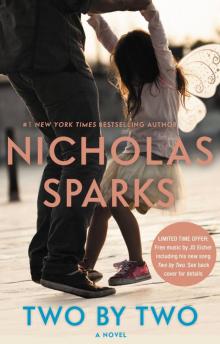 Two by Two
Two by Two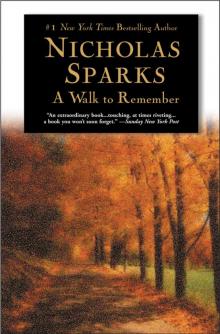 A Walk to Remember
A Walk to Remember The Guardian
The Guardian Dear John
Dear John The Last Song
The Last Song The Lucky One
The Lucky One The Wedding
The Wedding The Longest Ride
The Longest Ride Safe Haven
Safe Haven The Rescue
The Rescue The Wish
The Wish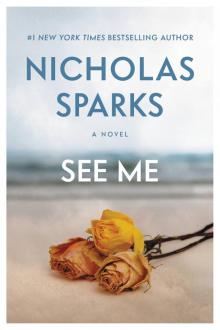 See Me
See Me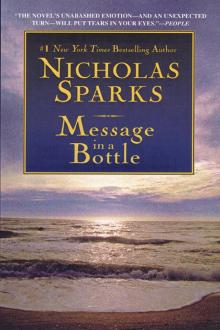 Message in a Bottle
Message in a Bottle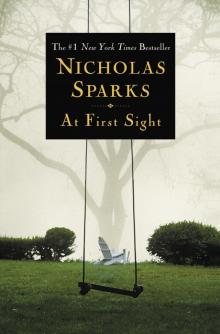 At First Sight
At First Sight True Believer
True Believer The Return
The Return A Bend in the Road
A Bend in the Road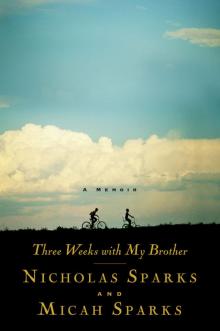 Three Weeks With My Brother
Three Weeks With My Brother Nights in Rodanthe
Nights in Rodanthe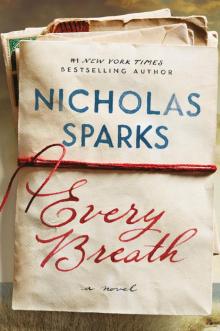 Every Breath
Every Breath